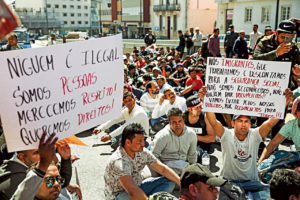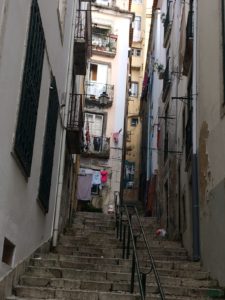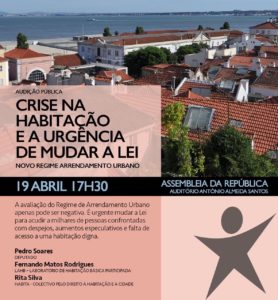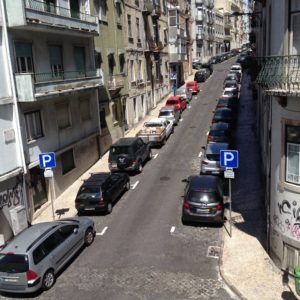‘Only foreigners work here, he confesses. It’s hard work and poorly paid. Sixteen hours a day for the minimum wage. You keep going because they give you a contract, that is needed for a permit.’ Amit Kumar, originating from India is 32 years old and works since 2013 in Portugal. First in horticulture in the Algarve and after that in a restaurant in Belem. Although he is paying tax and social security, he runs the risk of being expelled as he can’t prove to have entered the country in a legal way. In 2017 he falls ill and has to be admitted to hospital for a week. Being unable to pay the bill, he asks his uncle in India for help. ‘I was supposed to support my family over there, not the other way around.’
When he returns to work, he discovers he is fired.
 The ruling socialist party wants the government to speed up the legalization of undocumented immigrants, who have been working for more than a year and paid tax and social security. Even if they have entered the country illegally. The party invokes on Article 123 in the Aliens Act, which permits residency for foreigners on humanitarian grounds.
The ruling socialist party wants the government to speed up the legalization of undocumented immigrants, who have been working for more than a year and paid tax and social security. Even if they have entered the country illegally. The party invokes on Article 123 in the Aliens Act, which permits residency for foreigners on humanitarian grounds.
 The reason for the amendment was the large-scale demonstration in May, when immigrants gathered before Parliament, expressing that they were treated like second-rank citizens, even though they paid tax and social insurance.
The reason for the amendment was the large-scale demonstration in May, when immigrants gathered before Parliament, expressing that they were treated like second-rank citizens, even though they paid tax and social insurance.
‘It concerns a group of approximately 30.000 people, who have work commitments but no rights whatsoever’, explains Flora Silva, president of the solidarity organization Olho Vivo (www.olho-vivo.org). ‘Most of them are from Lisbon but also from the Algarve, where many people from Nepal and Indonesia work in agriculture.
 ‘The law doesn’t promote the integration of immigrants, who work here for many years but are not treated as human beings’, says Timóteo Macedo, president of Solidaridade Imigrante (Solim). ‘Our Government argues, that we need more immigrants for our economy. Fine. They are already here, just come and see!’
‘The law doesn’t promote the integration of immigrants, who work here for many years but are not treated as human beings’, says Timóteo Macedo, president of Solidaridade Imigrante (Solim). ‘Our Government argues, that we need more immigrants for our economy. Fine. They are already here, just come and see!’
Research by Solim in April showed that illegal immigrants pay on average 6 times more for a visit to the Emergency Department and 8 times more for a doctor’s consultation in Primary Health Care, than legal employees. ‘When undocumented workers pay their social security’, Macedo points out, ’there shouldn’t be any difference at all, isn’t it?’
Bom fim de semana Enjoy the weekend (pic Público)

 As of next week, a new
As of next week, a new  In most European countries domestic animals are tolerated in food courts.
In most European countries domestic animals are tolerated in food courts. According to an investigation in April by the Association for Consumer Protection (DECO), only
According to an investigation in April by the Association for Consumer Protection (DECO), only  Euthanasia continues to be a crime with prison sentences ranging from two to five years in “the land of the Maria’s” as Parliament
Euthanasia continues to be a crime with prison sentences ranging from two to five years in “the land of the Maria’s” as Parliament  Euthanasia – good death in old Greek – is
Euthanasia – good death in old Greek – is  ‘If boys have more privileges and sexual freedom in relationships than girls, there will be more social pressure to behave accordingly: strong, determined and protective’, reveals 18-year-old Catarina Machado. ‘
‘If boys have more privileges and sexual freedom in relationships than girls, there will be more social pressure to behave accordingly: strong, determined and protective’, reveals 18-year-old Catarina Machado. ‘ In a national survey among university students more than half stated to be victims of dating violence. Some were even threatened with death.
In a national survey among university students more than half stated to be victims of dating violence. Some were even threatened with death.
 ‘No, it is not okay’, mutters João. ‘We got a letter from the landlord the other day. Our contract expires in November. He wants to increase the rent from 300 to 800 euro a month and reduce the contract period to one year. I’ am sure he’ll increase the rent again next year.
‘No, it is not okay’, mutters João. ‘We got a letter from the landlord the other day. Our contract expires in November. He wants to increase the rent from 300 to 800 euro a month and reduce the contract period to one year. I’ am sure he’ll increase the rent again next year. ‘Where do you live?’, I ask
‘Where do you live?’, I ask Within five years rents in Lisbon increased by 36%.
Within five years rents in Lisbon increased by 36%. Housing is a priority for this government, that wants to build more affordable accommodation and has set aside 1,7 billion euros to give 26.000 needy families – half of them from Lisbon – a decent home within six years. It also intends to give municipalities the right to claim vacant properties for social habitation.
Housing is a priority for this government, that wants to build more affordable accommodation and has set aside 1,7 billion euros to give 26.000 needy families – half of them from Lisbon – a decent home within six years. It also intends to give municipalities the right to claim vacant properties for social habitation. Well, it’s a pity I’ am not one of those families and six years is a long time, especially at my age’, João replies.
Well, it’s a pity I’ am not one of those families and six years is a long time, especially at my age’, João replies. ‘It’s a shame how Portugal treats his refugees’, says Jose Manuel Pureza, MP of the Left Bloc (BE). ’The Portuguese government is – unlike many European countries – willing to accept more refugees. That’s positive. The problem, however, is the practical implementation.’
‘It’s a shame how Portugal treats his refugees’, says Jose Manuel Pureza, MP of the Left Bloc (BE). ’The Portuguese government is – unlike many European countries – willing to accept more refugees. That’s positive. The problem, however, is the practical implementation.’ ‘People are simply put somewhere and have no say at all in the conditions in which they are accommodated’, Vacchiano emphasizes. ‘As if a refugee doesn’t have a voice of his own. His educational background and profession don’t exist anymore. These are simply deleted.’
‘People are simply put somewhere and have no say at all in the conditions in which they are accommodated’, Vacchiano emphasizes. ‘As if a refugee doesn’t have a voice of his own. His educational background and profession don’t exist anymore. These are simply deleted.’ The granting of a residence permit by the SEF ( Serviço de Estrangeiros e Fronteiras) – Portugal’s immigration and border police – takes by and large 12 to 18 months. One can only apply for family reunification áfter obtaining the permit, which takes ‘at least another 5-6 months’, according to SEF.
The granting of a residence permit by the SEF ( Serviço de Estrangeiros e Fronteiras) – Portugal’s immigration and border police – takes by and large 12 to 18 months. One can only apply for family reunification áfter obtaining the permit, which takes ‘at least another 5-6 months’, according to SEF.
 Both left and right wing parties in Parliament are concerned about racism in the police force and violation of human rights in prisons. The reason is a recently published report of the European Committee against Torture, stating that police violence in Portugal – in particular against African descendants – is the highest in Western Europe.
Both left and right wing parties in Parliament are concerned about racism in the police force and violation of human rights in prisons. The reason is a recently published report of the European Committee against Torture, stating that police violence in Portugal – in particular against African descendants – is the highest in Western Europe. The committee – that also visited the country in 2013 – emphasizes that the police violence at police stations has increased and that the situation in the overcrowded prisons of Caxias, Setubal, and Lisbon is ‘inhuman and degrading.’
The committee – that also visited the country in 2013 – emphasizes that the police violence at police stations has increased and that the situation in the overcrowded prisons of Caxias, Setubal, and Lisbon is ‘inhuman and degrading.’ Julia Kozma, lawyer and chairing the European delegation, points the finger towards the Ministry of Internal Affairs – responsible for the police and the security forces – and regrets its lack of ‘awareness’. The Ministry denies the accusations and declares that ‘all complaints about violent police conduct are investigated by the Internal General Inspectorate (IGAI) and immediately reported to the Public Prosecutor.’
Julia Kozma, lawyer and chairing the European delegation, points the finger towards the Ministry of Internal Affairs – responsible for the police and the security forces – and regrets its lack of ‘awareness’. The Ministry denies the accusations and declares that ‘all complaints about violent police conduct are investigated by the Internal General Inspectorate (IGAI) and immediately reported to the Public Prosecutor.’ The reality, however, is that only a very small number of the complaints are brought before court. ‘And that’s exactly the problem’, says Kozma. ‘There is a spirit of impunity and bureaucracy, whereby complaining doesn’t help. The inspection body (IGAI) needs more skills to conduct criminal investigations and more resources to act independently.’
The reality, however, is that only a very small number of the complaints are brought before court. ‘And that’s exactly the problem’, says Kozma. ‘There is a spirit of impunity and bureaucracy, whereby complaining doesn’t help. The inspection body (IGAI) needs more skills to conduct criminal investigations and more resources to act independently.’ In recent months the non-governmental organization SOS racism received an increasing number of grievances from inmates in the prison of Lisbon about racist provocations and intimidations. Peculiar was that all complaints came from African immigrants and that any registration on xenophobe or racist behavior from the guards and staff is lacking.
In recent months the non-governmental organization SOS racism received an increasing number of grievances from inmates in the prison of Lisbon about racist provocations and intimidations. Peculiar was that all complaints came from African immigrants and that any registration on xenophobe or racist behavior from the guards and staff is lacking. Patients have to wait 3 years to see a urologist in Vila Real or an ENT specialist in Leiria and 2 years to obtain an appointment with a cardiologist in Guarda. These extremes not only occur in the countryside, as the waiting list for a neurological consultation at Amadora Sintra – one of the biggest state hospitals in the country – exceeds more than a year.
Patients have to wait 3 years to see a urologist in Vila Real or an ENT specialist in Leiria and 2 years to obtain an appointment with a cardiologist in Guarda. These extremes not only occur in the countryside, as the waiting list for a neurological consultation at Amadora Sintra – one of the biggest state hospitals in the country – exceeds more than a year. The average waiting period for (non-acute) specialist care in Portugal is 4 months, varying from 6 months for an ophthalmologist to 6 weeks for an obstetrician. Patients who have to wait for more than five months have – by law – the right to be treated in the private sector. A costly buffer as the SNS, respectively the taxpayer must pay the bill.
The average waiting period for (non-acute) specialist care in Portugal is 4 months, varying from 6 months for an ophthalmologist to 6 weeks for an obstetrician. Patients who have to wait for more than five months have – by law – the right to be treated in the private sector. A costly buffer as the SNS, respectively the taxpayer must pay the bill. The excessive waiting lists are – according to the independent trade union of doctors Sindicato Independente dos Médicos – mainly the result of the fact that specialists in state hospitals have to spend too much – almost half – of their time to emergencies. The majority of the specialists working in the SNS is therefore unsatisfied. Many want to abandon the service and either go into private practice or leave the country, where working conditions are better and the pay higher.
The excessive waiting lists are – according to the independent trade union of doctors Sindicato Independente dos Médicos – mainly the result of the fact that specialists in state hospitals have to spend too much – almost half – of their time to emergencies. The majority of the specialists working in the SNS is therefore unsatisfied. Many want to abandon the service and either go into private practice or leave the country, where working conditions are better and the pay higher. ‘Wages are indeed low, excess hours abundant and career prospects nil’, explains Maria Ferreira of the Public Health Department of the University of Porto, who conducted an investigation under 15.000 doctors in northern Portugal. ‘Half of the recently qualified doctors is thinking of leaving the country after finishing their specialization and over 1200 doctors have already left in the past 3 years.’
‘Wages are indeed low, excess hours abundant and career prospects nil’, explains Maria Ferreira of the Public Health Department of the University of Porto, who conducted an investigation under 15.000 doctors in northern Portugal. ‘Half of the recently qualified doctors is thinking of leaving the country after finishing their specialization and over 1200 doctors have already left in the past 3 years.’ A draft legislation thereupon was submitted in July 2017 and discussed in Parliament early this year. Heloísa Apolónia – MP of the Ecological and Green Party (PEV) – explains ‘our proposal is to ban the use of plastic disposables in restaurants and bars and to look for biodegradable substitutes within 3 years.’
A draft legislation thereupon was submitted in July 2017 and discussed in Parliament early this year. Heloísa Apolónia – MP of the Ecological and Green Party (PEV) – explains ‘our proposal is to ban the use of plastic disposables in restaurants and bars and to look for biodegradable substitutes within 3 years.’ António Fonseca, the president of the Association of Bars in the Historic Center of Porto (ABZHP) – that encourages the legalization of the use of alcohol in public places – believes that the plans are irresponsible in the light of the danger glassware can cause in nightlife.
António Fonseca, the president of the Association of Bars in the Historic Center of Porto (ABZHP) – that encourages the legalization of the use of alcohol in public places – believes that the plans are irresponsible in the light of the danger glassware can cause in nightlife.
